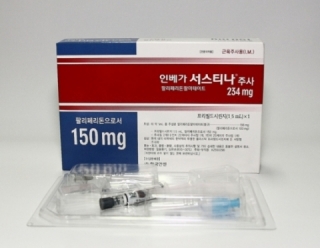Janssen Korea will have to increase the number of post-marketing surveillance (PMS) cases to 3,000 regarding the sales of schizophrenia drug Invega Sustenna Inj. and Invega Trinza Inj. (ingredient: paliperidone palmitate), the government said Monday.
According to the minutes of the Ministry of Food and Drug Safety (MFDS)’s central pharmaceutical affairs advisory committee on Feb. 23, Janssen Korea had sought the regulator’s advice whether its 1,943 PMS cases would be valid enough because the regulator usually demands 3,000 PMS cases.

In Korea, a drugmaker has to submit more than 3,000 PMS cases of a new drug to the regulator. However, in cases where an orphan drug supplier finds it difficult to secure patients due to the rarity of the disease, the company can adjust the PMS number through consultations with the MFDS.
Janssen said it was difficult to secure patients for PMS up to 3,000 because a rival drug was released in the domestic market. The company had asked the ministry to extend the PMS period for two more years.
In 2015, Janssen made a similar request to the government, but the ministry did not accept it.
This time, too, the advisory committee ordered the company to raise PMS cases to 3,000 and shorten the PMS period as much as possible from two years.
The committee said Janssen Korea was able to add 700 cases for the past year. Moreover, it became easier for the company to secure schizophrenia patients as the government expanded insurance coverage for the disease in March last year.
The committee also said that the drug’s rival Abilify Inj. (ingredient: aripiprazole) did not have a significant impact on Invega products.
Janssen Korea started selling Invega Sustenna Inj., a once-monthly formula in 2011, and Invega Trinza Inj., a three-month acting treatment, in 2016.
In the past, Invega Sustenna was the only once-monthly treatment for schizophrenia.
However, since Korea Otsuka Pharmaceuticals’ Abilify Inj. began to receive reimbursements in 2016, Invega has been competing against Abilify, according to Janssen. However, the government refuted Janssen’s claim that it was difficult to secure patients for PMS.
“As schizophrenia incidence keeps occurring above a certain number of cases, I oppose to stopping PMS without filling up the number to 3,000 cases. It is desirable to raise the number, even if the company extends the PMS period,” said a member of the central pharmaceutical affairs advisory committee.
“If patients can use the drug clinically, there would be no problem for the company to collect 3,000 cases for further survey. We also need measures to reflect the information of safety and efficacy, which was collected from 700 additional cases in the past year,” another committee member said.

